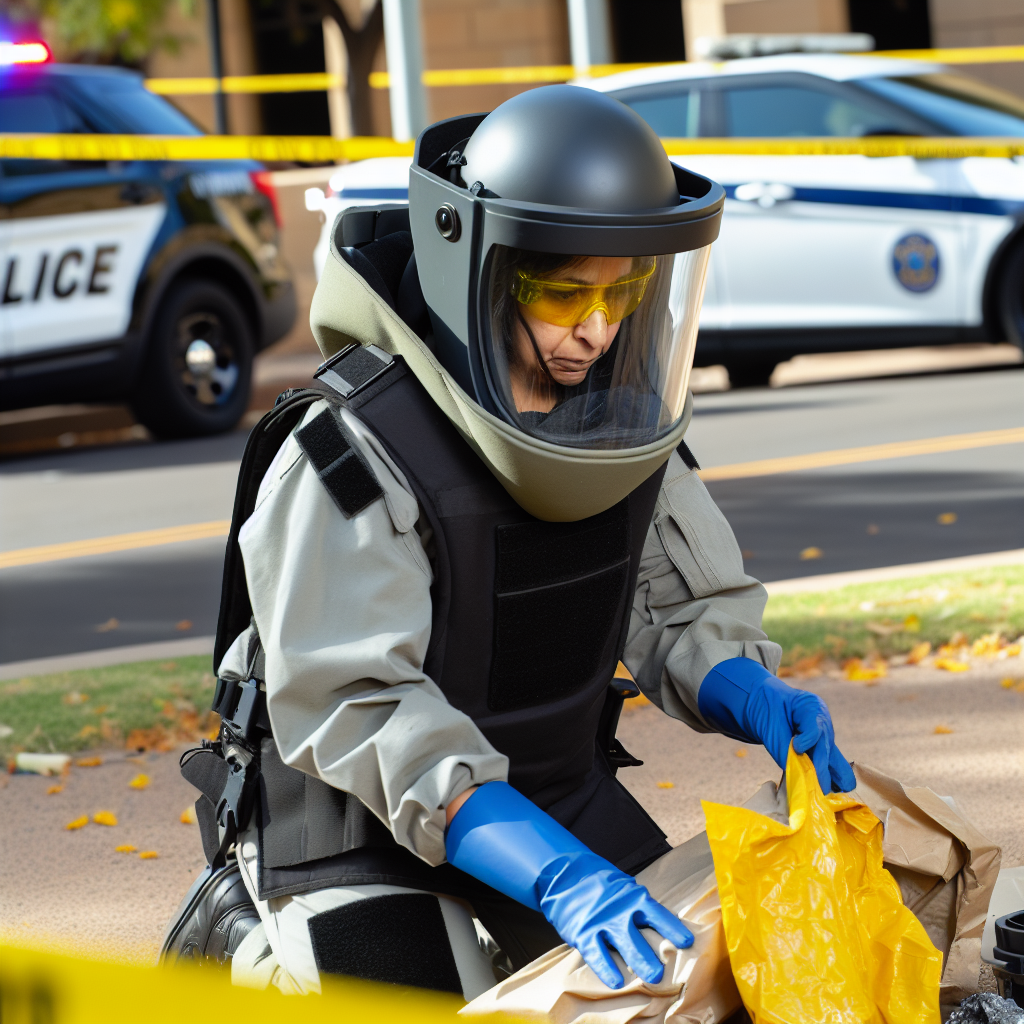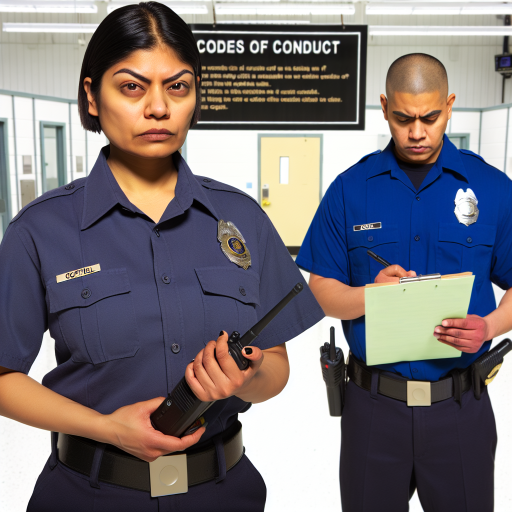During emergencies, bomb squad technicians play a critical role in ensuring public safety.
These technicians are highly trained professionals who specialize in handling explosive devices.
Their expertise is crucial in defusing bombs, investigating suspicious packages, and securing explosive materials.
In this blog post, we will delve into the vital responsibilities of bomb squad technicians.
Additionally, we will explore the training they undergo and the equipment they use.
Furthermore, we will discuss the risks they face and the importance of their swift response.
Bomb squad technicians are frontline responders in keeping communities safe from explosive threats.
Training and Qualifications of Bomb Squad Technicians
Bomb squad technicians are required to hold certifications and licenses that demonstrate their expertise in handling explosive materials.
These certifications ensure that they have received the necessary training to perform their duties safely and effectively.
- Required Certifications and Licenses
In addition to certifications, bomb squad technicians undergo specialized training in explosive ordnance disposal.
This training equips them with the knowledge and skills needed to safely handle and dispose of various types of explosives, including bombs, grenades, and improvised explosive devices (IEDs).
- Specialized Training in Explosive Ordnance Disposal
To stay abreast of the latest developments in bomb disposal technology, bomb squad technicians undergo continuous education and training.
This ensures that they are up to date on new techniques and equipment that can improve their ability to respond to emergency situations involving explosives.
- Continuous Education and Updates on New Technology and Techniques
The training and qualifications of bomb squad technicians are rigorous and ongoing.
These professionals play a crucial role in keeping communities safe from the threat of explosive devices.
Their expertise is essential in emergency response situations.
Equipment and Tools Used by Bomb Squad Technicians
Being a bomb squad technician is a high-risk job.
This role requires specialized equipment and tools.
They safely handle explosive devices.
Protective Gear
- Bomb Suits: Bomb squad technicians wear bomb suits to protect themselves from the impact of explosions and bomb fragments.
- Helmets: Bomb squad technicians also wear helmets to protect their heads from flying debris during explosions.
Detection and Diagnostic Equipment
- Explosive Detection Kits: These kits are used to identify explosive materials and devices in a suspicious package or location.
- X-ray Machines: Bomb squad technicians use X-ray machines to inspect the internal components of a suspected explosive device without physically handling it.
Disposal Tools
- Robotics: Bomb squad technicians use robots equipped with cameras and manipulator arms to remotely handle and disarm explosive devices.
- Explosive Ordnance Disposal (EOD) Tools: These tools include disruptors, water cannons, and controlled detonation devices to safely neutralize bombs.
By utilizing specialized equipment and tools, bomb squad technicians effectively respond to and mitigate the threat posed by explosive devices.
Transform Your Career Today
Unlock a personalized career strategy that drives real results. Get tailored advice and a roadmap designed just for you.
Start NowIt is crucial for these professionals to stay updated with the latest technology and techniques.
This ensures the safety of themselves and the surrounding community.
Find Out More: Detective Associations in the USA: Networking and Support
Handling Emergency Situations by Bomb Squad Technicians
When it comes to handling emergency situations, bomb squad technicians follow a strict set of procedures.
This ensures everyone’s safety and neutralizes potential threats.
Assessing the Threat Level and Potential Danger
First, bomb squad technicians must assess the situation.
This assessment determines the level of threat and potential danger.
They gather information on the type of device, its location, and any potential triggers.
Establishing a Safe Perimeter and Evacuating Civilians
Once the threat level is determined, technicians establish a safe perimeter.
This action prevents any potential harm to bystanders.
Civilians in the vicinity are evacuated to a safe distance.
Using Robots or Remotely Controlled Devices
Technicians often rely on robots or remotely controlled devices to handle suspicious packages.
These tools allow them to inspect, move, or disarm dangerous items from a safe distance.
By using robots, technicians reduce the risk of injury and prevent potential detonations.
Bomb squad technicians play a critical role in emergency response situations.
They follow strict procedures to assess threats and utilize advanced technologies.
Their expertise is essential in protecting lives and ensuring public safety during crises.
Learn More: Case Studies: Success Stories of US Detective Investigations
Collaboration in Emergency Response
When it comes to emergency response situations, bomb squad technicians play a crucial role in ensuring the safety and security of the public.
However, they do not work in isolation.
Transform Your Career Today
Unlock a personalized career strategy that drives real results. Get tailored advice and a roadmap designed just for you.
Start NowCollaboration with other emergency response teams is essential in effectively handling incidents involving explosive devices.
Coordination with Law Enforcement Agencies and SWAT Teams
Bomb squad technicians often work closely with law enforcement agencies and SWAT teams to assess the situation.
These teams help determine the best course of action.
Law enforcement officers provide security and support.
SWAT teams may assist in securing the perimeter and providing additional resources.
Communication with Firefighters and Medical Personnel on Scene
During emergencies, bomb squad technicians must communicate effectively with firefighters and medical personnel.
Firefighters may be called in to address any fires that result from an explosion.
Medical personnel may be needed to provide assistance to any injured individuals.
Working Together with Federal Agencies like the FBI and ATF
For high-profile incidents, bomb squad technicians collaborate with federal agencies such as the FBI and ATF.
These agencies bring additional expertise and resources to the table.
They help manage the situation effectively.
You Might Also Like: The Interplay: Detectives and the US Criminal Justice System
Risks and Challenges Faced by Bomb Squad Technicians
When it comes to the role of bomb squad technicians, there are numerous risks and challenges they face on a daily basis.
These brave men and women put their lives on the line to ensure the safety of others.
It’s important to understand the dangers they encounter.
High-pressure situations with limited time to make decisions
Bomb squad technicians often find themselves in high-pressure situations where every second counts.
They must make split-second decisions that can mean the difference between life and death.
The pressure to act quickly and decisively adds an immense amount of stress to their already demanding job.
Potential for injury or death when dealing with explosive devices
One of the most obvious risks bomb squad technicians face is the potential for injury or death when dealing with explosive devices.
These devices are designed to cause massive destruction.
Transform Your Career Today
Unlock a personalized career strategy that drives real results. Get tailored advice and a roadmap designed just for you.
Start NowEven the smallest mistake can have catastrophic consequences.
Despite their extensive training and expertise, there’s always a lingering fear of the unknown when handling these deadly weapons.
Mental and emotional stress from handling dangerous materials
In addition to the physical risks involved, bomb squad technicians also face significant mental and emotional stress.
The constant exposure to dangerous materials can take a toll on their mental well-being.
They must constantly be on high alert, ready to respond to any potential threat that comes their way.
You Might Also Like: Understanding the CSI Effect on US Detective Work

Case studies of successful bomb squad operations
– Real-life examples of bomb technicians diffusing explosive devices
– Stories of bravery and quick thinking in emergency situations
– An analysis of what made these operations successful
One of the most critical aspects of bomb squad technicians’ role is their ability to successfully diffuse explosive devices in emergency situations.
Let’s delve into some case studies where bomb technicians displayed exceptional skills and bravery.
Real-life examples of bomb technicians diffusing explosive devices:
- In 2015, a bomb squad technician in New York City successfully dismantled a live pipe bomb found near a crowded subway station.
- During a hostage situation in Texas, a bomb squad technician safely disarmed a makeshift explosive device planted by the perpetrator.
- In a remote area of Afghanistan, a bomb squad technician neutralized a complex IED, preventing potential harm to military personnel.
Stories of bravery and quick thinking in emergency situations:
- A bomb squad technician in London remained calm under pressure and swiftly defused a car bomb outside a government building.
- During a terrorist threat in Paris, a bomb technician acted swiftly to neutralize a suspicious package, averting a potential disaster.
- In a shopping mall in the US, a bomb squad technician courageously tackled a suspicious package, ensuring the safety of shoppers and staff.
An analysis of what made these operations successful:
Several key factors contributed to the success of these bomb squad operations, including:
- Extensive training and expertise in handling explosive devices.
- Quick thinking and problem-solving skills under pressure.
- Effective communication and coordination with other emergency responders.
- Use of cutting-edge technology and equipment for bomb detection and defusal.
- Strategic planning and execution of the operation to minimize risks and collateral damage.
Training and Career Opportunities for Aspiring Bomb Squad Technicians
For individuals interested in becoming bomb squad technicians, there are specific steps and requirements.
Information on How to Become a Bomb Squad Technician
1. Education: Most bomb squad technicians have a background in law enforcement, military, or engineering.
A high school diploma or GED is usually required.
Many technicians pursue advanced degrees in related fields.
2. Training: After meeting the educational requirements, aspiring bomb squad technicians must undergo specialized training.
This training focuses on explosive ordnance disposal (EOD) techniques and procedures.
It is typically provided by law enforcement agencies or military branches.
3. Certification: To work as a bomb squad technician, individuals must obtain certification from the Hazardous Devices School.
Transform Your Career Today
Unlock a personalized career strategy that drives real results. Get tailored advice and a roadmap designed just for you.
Start NowThis school is run by the FBI.
The certification demonstrates a technician’s proficiency in handling explosives safely and effectively.
Job Outlook and Salary Potential in the Field
1. Job Outlook: The demand for bomb squad technicians is expected to grow due to increasing security threats.
There is a need for specialized skills in handling explosives.
This field offers stable employment opportunities in both the public and private sectors.
2. Salary Potential: Bomb squad technicians can earn competitive salaries.
The average annual salary ranges from $50,000 to $100,000.
Compensation depends on experience, location, and employer.
Technicians employed by government agencies tend to earn higher salaries than those in the private sector.
Resources for Further Education and Training
1. National Tactical Officers Association (NTOA): The NTOA offers training programs and resources for law enforcement professionals.
This includes bomb squad technicians.
These programs cover various topics related to explosive ordnance disposal and tactical operations.
2. Federal Emergency Management Agency (FEMA): FEMA offers courses and certifications in emergency management and response.
This can be beneficial for bomb squad technicians looking to enhance their skills.
3. International Association of Bomb Technicians and Investigators (IABTI): The IABTI provides networking opportunities and training seminars.
They also offer certification programs for bomb technicians and investigators.
Membership in this association can be valuable for professionals seeking to expand their expertise.
Pursuing a career as a bomb squad technician requires dedication and specialized training.
With the right education and experience, individuals can build a rewarding career in this field.
Conclusion
Bomb squad technicians play a vital role in emergency response.
Transform Your Career Today
Unlock a personalized career strategy that drives real results. Get tailored advice and a roadmap designed just for you.
Start NowThey ensure the safe removal and disposal of explosive devices.
These professionals undergo rigorous training and possess specialized skills.
They handle highly dangerous situations with precision and expertise.
Bravery and dedication in the face of danger deserve our utmost appreciation.
It is important to acknowledge their critical role in public safety.
As readers, we should learn about the work of bomb squad technicians.
Understanding the risks they take helps us support their efforts.
Let us show gratitude for their selfless service and commitment.




